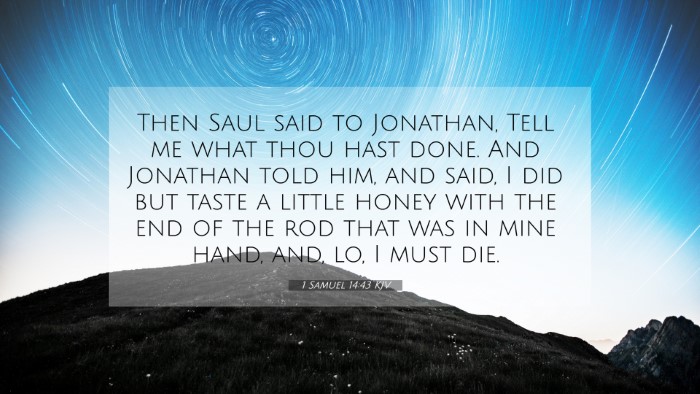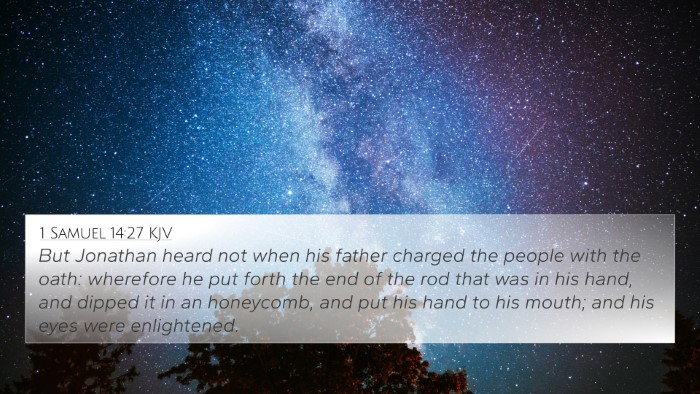Bible Verse Interpretation of 1 Samuel 14:43
Verse: "Then Saul said to Jonathan, 'Tell me what you have done.' So Jonathan told him and said, 'I indeed tasted a little honey with the end of the rod that was in my hand. And here I am; I must die!'" (1 Samuel 14:43)
Overview
This verse captures a crucial moment in the narrative of Saul and Jonathan, reflecting themes of authority, familial loyalty, and the consequences of one's actions. Jonathan's act leads to a dramatic revelation and a test of Saul's leadership.
Commentary Insights
Matthew Henry's Commentary
Saul's Authority: Matthew Henry highlights Saul's inquisitive nature as a king, probing into Jonathan's actions. He suggests that Saul represents the flawed authority that can lead to rash decisions based on oaths made without considering the consequences.
Jonathan's Honesty: Jonathan's candidness in admitting to his small act speaks volumes about his integrity. He is concerned about the repercussions dictated by his father's impulsiveness.
Albert Barnes' Commentary
Innocent Action, Severe Consequence: Barnes emphasizes the irony of Jonathan's innocent action (tasting honey) leading to a harsh reaction from Saul. This indicates the unpredictable nature of leadership in times of conflict.
Devotion to Family: Jonathan's willingness to face death rather than deny his actions underlines his loyalty to both his father and the divine order, creating tension in their relationship.
Adam Clarke's Commentary
The Burden of an Oath: Clarke discusses the weight of Saul’s oath, which was made hastily and ultimately was unjust to Jonathan, revealing the potential dangers of making promises without foresight.
Symbol of the Honey: The honey symbolizes sweetness and sustenance, contrasting sharply with the bitterness of Jonathan's fate; thus, exhibiting how something good can lead to dire consequences in a flawed system.
Thematic Connections
This verse is rich with thematic connections that resonate with various other scriptural references:
- 1 Samuel 14:24: Contextualizes the oath Saul made, illustrating the weight of his decisions.
- Proverbs 18:21: Speaks to the power of words and oaths, highlighting the ramifications of reckless speech.
- James 1:13-15: Discusses the notion that temptation leads to sin and death, mirroring Saul's rashness leading to Jonathan's plight.
- Exodus 20:12: The commandment to honor one's parents, which Jonathan exemplifies despite the conflict with Saul's decisions.
- Matthew 5:33-37: Jesus teaches about the seriousness of oaths, reflecting the unpredictability of oaths akin to Saul's.
- Romans 14:15: Paul speaks on not letting one’s actions lead to the downfall of another, a perfect fit for Jonathan's situation.
- Psalms 55:12-14: Highlights betrayal within friendships and family, resonating with Jonathan’s predicament under Saul's decree.
Conclusion
1 Samuel 14:43 serves not only as a narrative climax in the life of Jonathan and Saul but also opens avenues for deep theological reflections about leadership, consequence, and familial obligations. It challenges us to consider our promises and the potential fallout of our actions upon others.
Cross-Referencing Insights
This verse, while standing alone, can be effectively cross-referenced with other scriptures to build a deeper understanding. Leverage tools for Bible cross-referencing to explore:
- How to find cross-references in the Bible: Utilizing Bible concordance and guides can facilitate better insights.
- Identifying connections between Old and New Testament: Understanding biblical concepts through inter-Biblical dialogue.
- Cross-referencing Bible study methods: Employing thematic analysis can reveal larger patterns.
In summary, this exploration of 1 Samuel 14:43 through the lenses of renowned commentators illuminates the intricacies of the text and enhances one’s understanding of its implications.





